Key takeaways:
- Anti-racism education encourages individuals to confront their biases and engage in meaningful conversations, fostering empathy and understanding.
- It is essential for creating solidarity among diverse communities, promoting advocacy, and understanding systemic inequalities.
- The connection between anti-racism and pro-life advocacy is rooted in the shared belief in the dignity of every life, emphasizing the importance of uplifting marginalized voices.
- Implementing anti-racism education involves assessing community awareness, creating inclusive curricula, and fostering ongoing dialogue for lasting change.
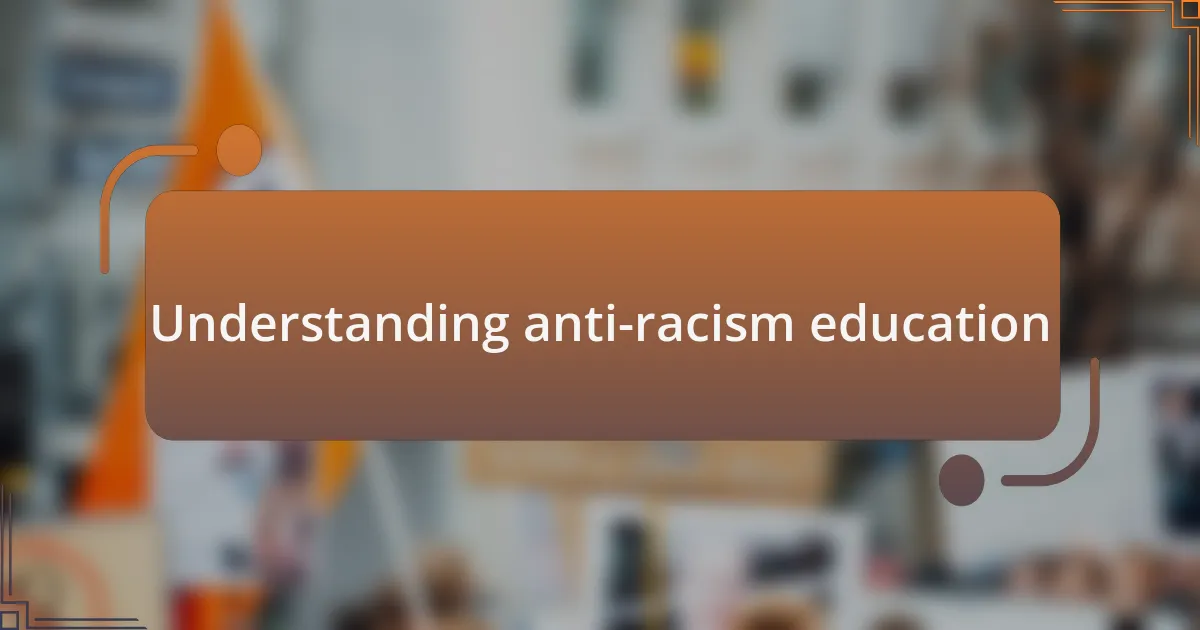
Understanding anti-racism education
Anti-racism education goes beyond simply teaching about racism; it invites individuals to actively engage in challenging and dismantling systemic inequalities. I remember a time when I realized that my understanding of racism was limited to just the overt acts of hostility I had seen. This education opened my eyes to the subtle, insidious ways racism permeates society and affects daily lives, often in ways we don’t notice.
Exploring anti-racism calls for introspection—are we really aware of our biases? I vividly recall participating in a workshop where we discussed our experiences and confronted our discomfort with uncomfortable truths. This kind of dialogue fosters empathy and encourages us to listen to the stories of those affected by racism, pushing us to recognize our roles in the broader narrative.
The emotional weight of these conversations is undeniable; it’s often uncomfortable but deeply necessary. When I share my own journey of unlearning biases, it resonates with others, prompting them to share their experiences as well. Anti-racism education isn’t just about knowledge; it’s about sparking reflection and inspiring meaningful change in ourselves and our communities.
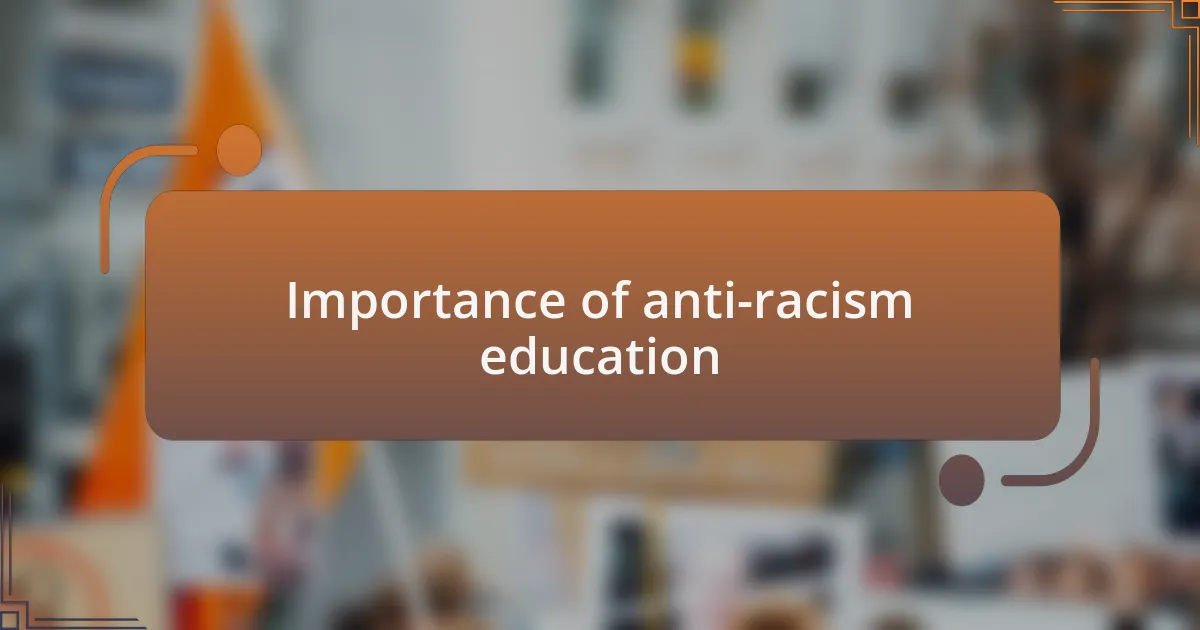
Importance of anti-racism education
Anti-racism education is crucial because it empowers individuals to recognize and challenge their own biases. I remember the awakening moment when I participated in a community discussion that disassembled stereotypes we’d unconsciously held. That experience taught me that recognizing our own biases is the first step towards genuine empathy and advocacy.
Moreover, anti-racism education fosters a sense of solidarity among diverse communities. I’ve witnessed friendships blossoming in spaces where honest conversations about race and privilege take precedence. This connection deepens our understanding and commitment to creating inclusive environments that benefit everyone.
Ultimately, understanding the depth of racial injustice is vital in combating it. How can one advocate for a cause they don’t fully grasp? There was a time I felt overwhelmed by the breadth of systemic inequalities, but through education, I found clarity in my advocacy work. Each lesson learned equips us to not only stand against racism but to actively create a more equitable society.
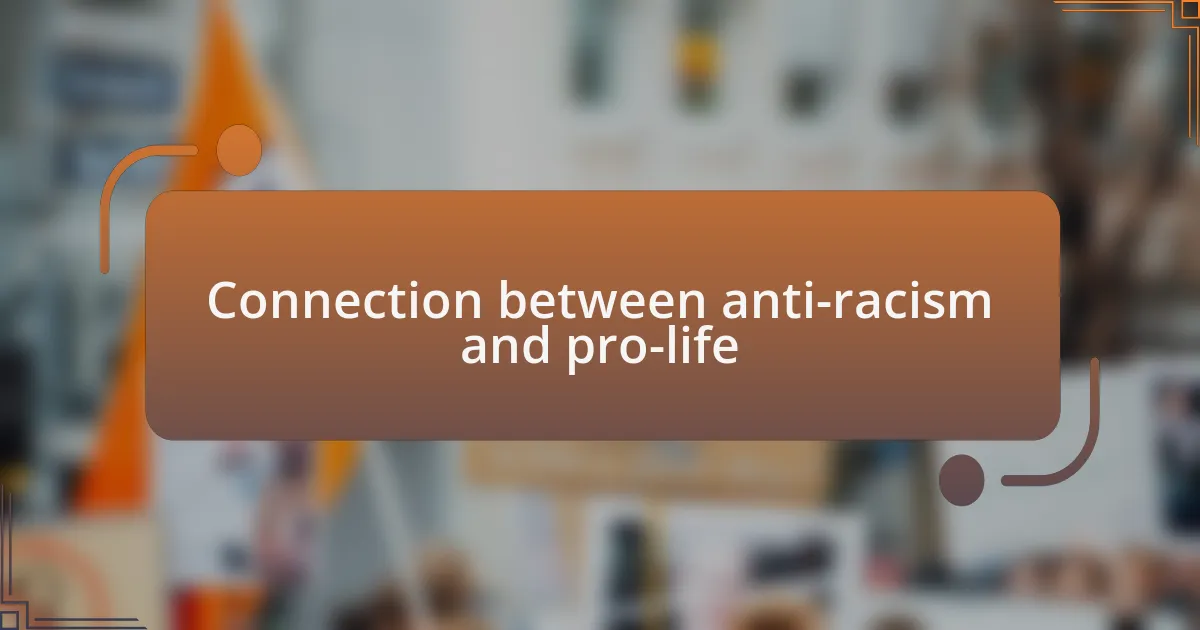
Connection between anti-racism and pro-life
The connection between anti-racism and pro-life advocacy is rooted in the shared belief that every life—regardless of race, background, or circumstance—possesses inherent dignity. I remember a time when I attended a pro-life conference where we discussed not just the value of life in the womb but the need to uplift marginalized voices. It struck me how vital it is to ensure that all lives are respected and protected in every context, echoing the essence of both movements.
When we confront racial injustices, we’re furthering the pro-life message by advocating for those often overlooked or voiceless. For instance, I once volunteered at a local women’s shelter where many residents were from minority communities. Listening to their stories of struggle reinforced my belief that our fight for life extends beyond birth—it is about creating an environment where every person can thrive, regardless of their race or background.
Embracing anti-racism within the pro-life framework enriches our advocacy. I have found that the more we educate ourselves about the histories of different communities, the stronger our collective resolve becomes. Isn’t it empowering to think that by promoting anti-racism, we’re also reinforcing a culture that values all stages of life? This intertwined approach helps us build a more just society, reflecting a true commitment to the sanctity of life.
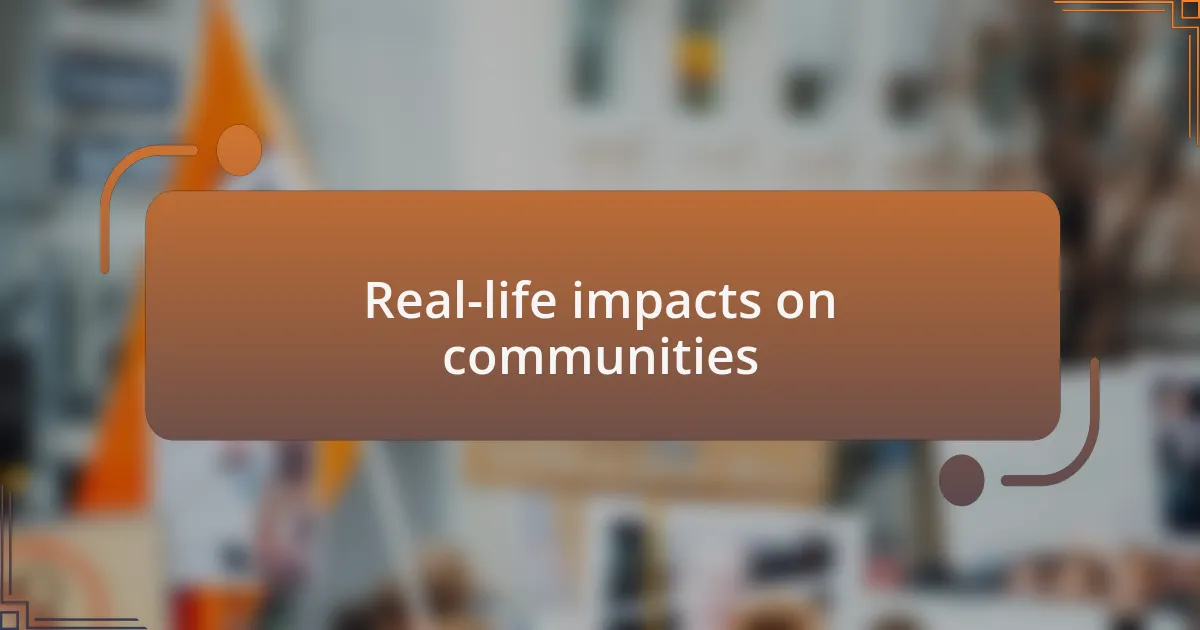
Real-life impacts on communities
The impacts of anti-racism education on communities often manifest in profound ways. I vividly recall attending a community workshop focused on bridging racial divides, where participants shared their own experiences. It was eye-opening to hear firsthand accounts of how racism had affected their families, highlighting the deep-rooted issues that still exist today. These stories resonated with me, emphasizing that education is not just about information—it’s about understanding and empathy.
In neighborhoods where anti-racism initiatives are implemented, I’ve seen a noticeable shift in community dynamics. For example, a local initiative I participated in encouraged dialogue between diverse groups, resulting in stronger relationships and a more unified community spirit. When people come together to discuss their differences and shared struggles, it cultivates an environment where everyone feels valued and empowered. Doesn’t it make you wonder how much healing can occur simply by fostering open conversations among neighbors?
The real-life benefits extend beyond individual growth; they create lasting change in societal attitudes. One day, after volunteering at a community outreach event focused on racial justice, a participant approached me and expressed how inspired they felt to take action within their own circles. Witnessing this transformation reminded me that anti-racism education can spark a ripple effect through communities, encouraging individuals to advocate for justice and dignity for all. Isn’t it remarkable how educating ourselves can elevate entire neighborhoods towards a more inclusive future?
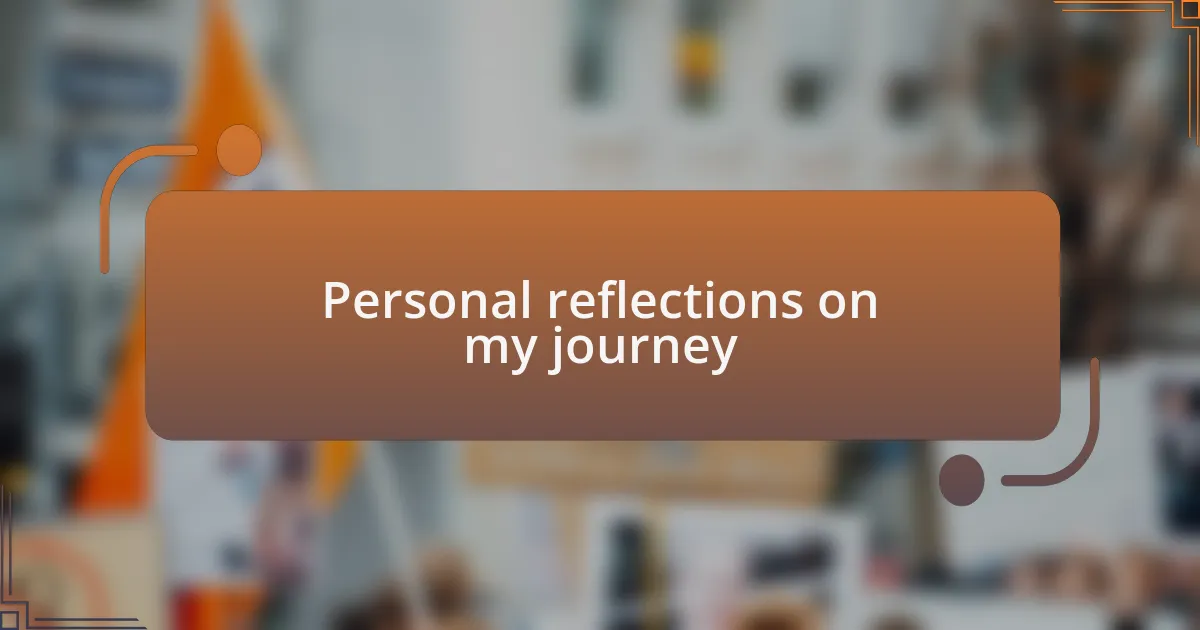
Personal reflections on my journey
Reflecting on my journey, I realize how pivotal moments shape our understanding of anti-racism. I remember a poignant encounter I had with a friend who shared their family’s struggles with discrimination. It struck a chord with me—how could I be so unaware of their pain? This revelation sparked a deep desire within me to learn more and become a better ally, understanding that my privilege carries a responsibility to advocate for change.
There was a moment during a training session I attended where I felt a mix of discomfort and growth. As we discussed privilege, I found myself grappling with the weight of my own experiences. It was a challenge to confront my biases and the societal structures upheld by them. Yet, I walked away feeling empowered; acknowledging these truths is the first step toward being a more conscious participant in the fight against racism. What would society look like if we could all engage in this level of honesty about our roles?
As I look back, I see each interaction, each story, as a stepping stone on this journey. One particularly impactful discussion was with a group of youth, eager to share their perspectives. Their passion energized me, reminding me that the younger generation carries the torch in this battle. Isn’t it inspiring to think how their voices and actions can reshape our communities? I firmly believe that by listening and learning from these young leaders, we not only enrich our understanding but also strengthen the collective push towards a more equitable society.
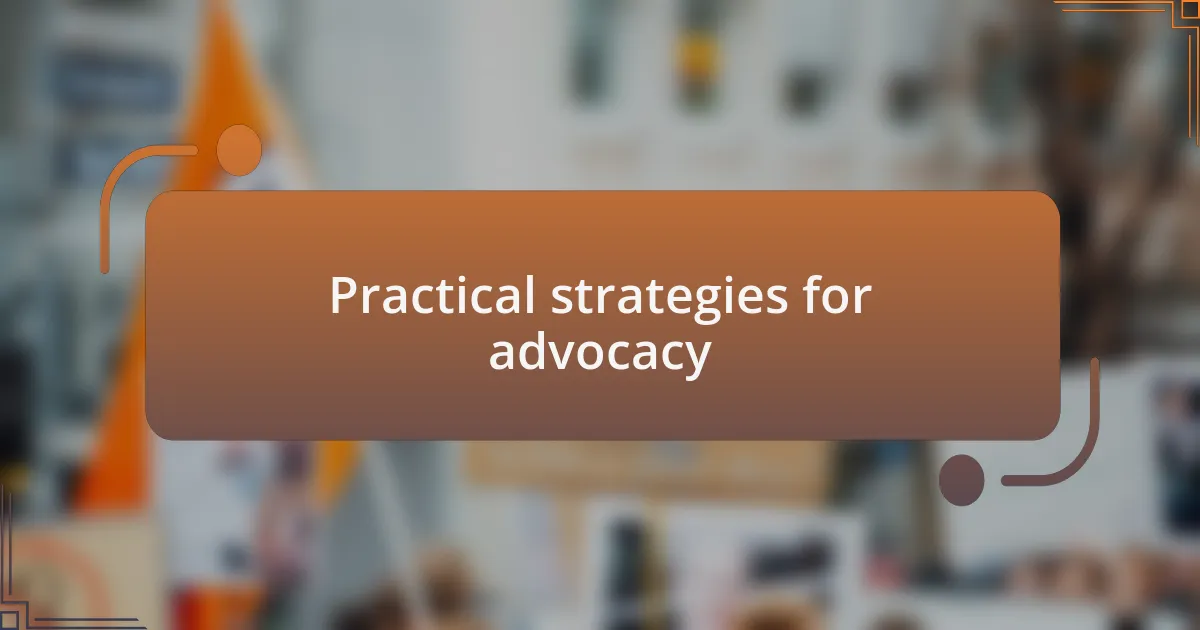
Practical strategies for advocacy
Advocacy is most effective when we approach it collaboratively. I recall a community forum I attended, where diverse voices came together to share their experiences and ideate solutions. Engaging in such discussions helped me realize the power of collective action – can you imagine what we could accomplish if we fully harness our shared strengths?
Another strategy I’ve found invaluable is educating myself and others about racial issues and historical context. I often invite friends over for a book club focused on literature that highlights diverse experiences. Sharing insights from these narratives has not only opened crucial conversations but has also fostered deeper empathy among my circle. Have you ever seen how a single book can ignite a passion for change?
Additionally, volunteering with organizations dedicated to anti-racism work has provided me with hands-on experience and tangible impact. I still remember the energizing feeling of working on a local campaign that focused on equitable education access for all students. Seeing the difference we can make when we unite for a cause is truly uplifting—what can be more fulfilling than contributing to a mission that seeks justice for every individual?
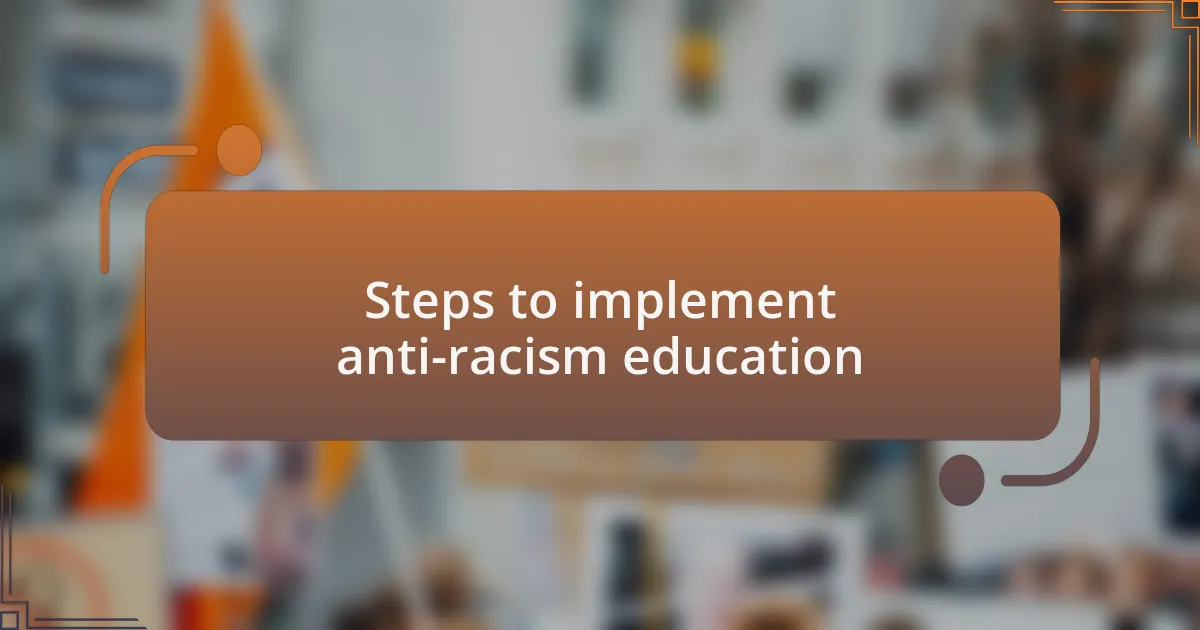
Steps to implement anti-racism education
When implementing anti-racism education, the first step is to assess the current understanding and awareness within your community. I remember facilitating a workshop where we started by sharing personal stories about the impact of racism on our lives. It was eye-opening to see participants recognize their own biases and experiences. Have you ever sat down and considered how your own background shapes your views?
Next, creating a curriculum that reflects diverse perspectives is crucial. I once collaborated with educators to develop lesson plans that included voices from historically marginalized groups. This collaborative approach sparked vibrant discussions in classrooms, illustrating how inclusive education not only informs but also inspires students. Isn’t it powerful when young people see themselves represented in what they learn?
Lastly, fostering an ongoing dialogue about anti-racism is essential for lasting change. I’ve found that hosting monthly discussion circles creates a safe space for people to express their concerns and growth. This continuous openness has not only built trust but has also allowed for deeper connections within the community. How often do we truly listen to one another? Embracing those conversations can pave the way for understanding and healing.